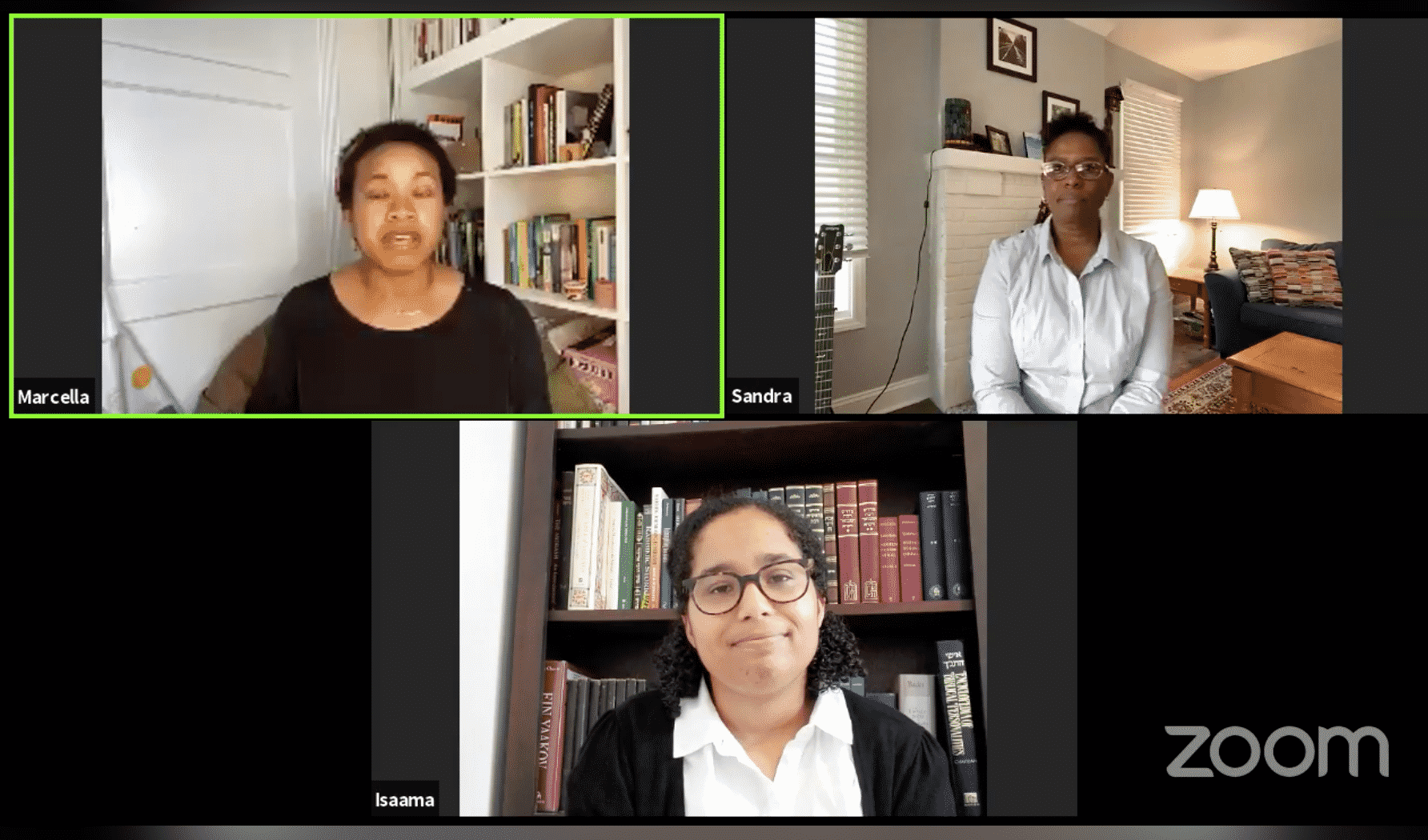 From left: Marcella White Campbell, Rabbi Sandra Lawson and Rabbi Isaama Goldstein-Stoll during the Juneteenth Kabbalat Shabbat service. Screenshot from Facebook.
From left: Marcella White Campbell, Rabbi Sandra Lawson and Rabbi Isaama Goldstein-Stoll during the Juneteenth Kabbalat Shabbat service. Screenshot from Facebook. Juneteenth, also known as Freedom Day or Emancipation Day, commemorates the announcement of the abolition of slavery on June 19, 1865, in Texas. Last Friday, among the proliferation of Juneteenth celebrations, several programs took a Jewish approach.
Be’chol Lashon, which has been celebrating and advocating for the racial and ethnic diversity of the Jewish people since 2000, celebrated with a prayer service welcoming Shabbat and featuring two rabbis of color, Rabbi Sandra Lawson and Rabbi Isaama Goldstein-Stoll. Keshet, the National Council of Jewish Women and Clal co-hosted.
Nearly 7,000 people registered. After reaching Zoom’s maximum capacity of 1,000, overflow was accommodated via a livestream on Facebook. (An edited version of the livestream is available at the Global Jews Facebook page.)
“Every week, Jews around the world welcome Shabbat with songs of praise and joy, recalling the creation of a world in which all of us are fully free,” said Be’chol Lashon’s Director of Marketing and Communications Marcella White Campbell on the call. “Almost 250 years after the first enslaved Black people set foot on North American soil, all their descendants were finally set free and their humanity was recognized under the law. That was the true beginning of independence for Americans …. And, like Shabbat, this is worth celebrating with joy and with song.”
“We need to show up, educate ourselves and amplify queer voices of color.” — Rachel Kann
“Two rabbis, black women, queer, leading a Juneteenth Shabbat service with thousands listening and watching. It’s a pretty monumental watershed moment,” singer-songwriter Julie Silver wrote in the stream’s Facebook comments.
Goldstein-Stoll and Lawson invoked that week’s Torah portion, about spies sent to explore Israel who returned with negative reports. Only two, Joshua and Caleb, had “courage and faith,” Lawson said. “In this moment, we need faith, we need strength and we need to believe,” she added, offering a song with lyrics by civil rights leader Ella Baker: “We who believe in freedom cannot rest until it comes.”
“Both Juneteenth and this week’s parsha beg the question of what happens when we are unwilling to address and lean into discomfort,” Goldstein-Stoll said. “I pray for myself and for everyone that in all the noise and craziness, we can take moments to sit in the discomfort and make the unbearable a bit more bearable.”
Lawson offered prayers for healing, invoking Moses’ plea to God, “el na refa na la” (‘please, God, heal her’), on behalf of his sister Miriam. “I want us to think of ‘her’ [here] as healing our country in this moment,” Lawson said.
Be’chol Lashon was founded in 2000 as a response to a “Study of Racial & Ethnic Diversity of the American Jewish Community,” which found that 20% of America’s 6 million Jews are African American, Latino/Hispanic, Asian, mixed race, Sephardic and Mizrahi.
“The Jewish community should affirm all events where oppressed peoples make advancements toward freedom,” said Rabbi Heather Miller, founder of Keeping It Sacred. “Juneteenth is an important milestone in the struggle for freedom for the Black community … “All Black lives, including Black Jewish lives, matter,” she said. “We are committed philosophically, financially, structurally and spiritually to affirming that value.”
“Mah norah! How awesome that these extraordinary leaders would invite us to their Shabbat with so much graciousness and generosity,” poet Rachel Kann said. “This is only the beginning. We need to show up, educate ourselves and amplify queer voices of color. I look forward to the Jewish world continuing to co-create a reality, which welcomes Black female leadership and supports it. We have work to do!”





















 More news and opinions than at a Shabbat dinner, right in your inbox.
More news and opinions than at a Shabbat dinner, right in your inbox.